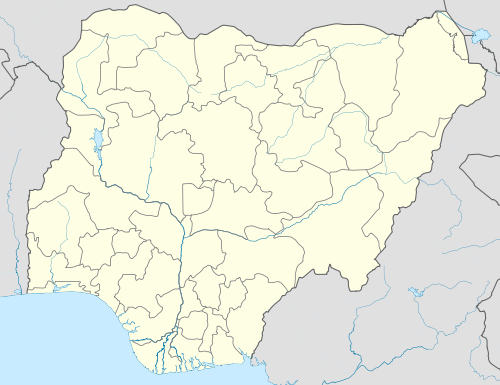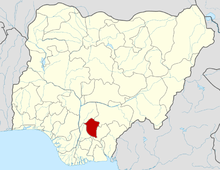Edem
| Edem | |
|---|---|
 Edem Location in the state of Enugu | |
| Coordinates: 6°51′43″N 7°20′21″E / 6.86194°N 7.33917°ECoordinates: 6°51′43″N 7°20′21″E / 6.86194°N 7.33917°E | |
| Country |
|
| State | Enugu State |
| Population (2006 census) | |
| • Total | 309,633 |
| Time zone | WAT (UTC+ 1) |
| Post Code | 410[1] |
| Area code(s) | 042 |
Edem is a town in Nsukka Local Government Area of Enugu State, Nigeria. Today, it is made up of three autonomous communities: Akpa-Edem, Ozi-Edem and Edem-Ani.[2]
It is approximately 30 to 40 square kilometers and has many of hills providing views from multiple points. The population of Edem is 309,633 based on the National Population Census conducted in 2006, but more than half of this number live outside Edem.
Edem shares common borders with Obimo on the south, Nsukka on the east, Ibagwa Ani on the north, and Nrobo on the west. Towns along the border include Okpuje near Owa and Egu Amegu, Abbi near Egu Amegu Abbi, Ugwuoke Ugwuinyi near Egu Amegu, and Ero Uno near Edem-Ani.
Some villages in edemma ay claim to Igala ancestry, but live today as Igbos since the division of the country into states and geo-political zones resulted in their location in the southeast of Nigeria. Due to their origin, they are referred to as Northern Igbos because of their closeness in ancestry and location to Northern Nigeria, as well as their location in the northern part of Igboland.
Composition of Edem
Edem is made up of 37 communities or villages:
Akpa-Edem Zone
- Ama Oba
- Amadimba
- Amadimogo
- Amankwa
- Dimunazu
- Igoro Agbo
- Igoro Ugwu
- Isamani
- Nkawushi
- Okiti
- Owa-Edem
- Uwenu Na Uwani Obeke
Ozi-Edem Zone
- Ama Uwenu
- Amabunegu
- Amamkpume
- Amaukpa
- Amaukwa
- Ikwe Ezike
- Obinegun Ii
- Ukpara
- Umueyi
- Umuoji
- Umuoko
Edem-Ani Zone
- Amaenu-Edem
- Amaezumesu
- Amaogwu
- Isu
- Nkofi
- Odojo
- Ogbododu
- Owere-Ugwu
- Owereagbo
- Ozara
- Ubogidi
- Umuchiagwu
- Umuchioke
- Uwani-Edem
Each of the villages is headed by an Onyishi according to the culture and traditions of the Nsukka zone.
Life and religion
Edem is known for having indigenes that live very long lives, frequently over 100 years. This may be attributed to the quality of life or other factors.[3]
Christianity is one of the main religions in Edem. Amongst all the denominations, the area is largely dominated by Catholics.[4] Regardless, almost all the major Christian denominations have a presence in Edem,[5] which is a change from Edem of old which was known to have priestesses and traditional worshippers.[6] Presently, the practice of idol worshipping is still common.[7]
Economy
The main economic activity in the kingdom is agriculture. The people practice shifting cultivation and crop rotation because of the enormous land mass of the area and the fertility of the land.
Cash crops: kolanuts, oil beans, breadfruit, black-eyed beans, brown beans, yams, cocoyams, cowpeas, maize, cotton, and groundnuts.
Fruits: citrus fruits (tangerines, lemons, limes, grapefruits, and oranges), cashews, avocado pears, guavas, pawpaws, pineapples, bananas, watermelons, mangoes, pears, African star apples, black apples, blue apples, showasho and irvingia(wild mangoes or bush mangoes).
Vegetables: light green amaranth, dark green amaranth, ahihara, waterleaves, bitterleaves, pumpkins, garden eggs, fluted pumpkins, okra, red chili peppers, yellow chili peppers, alligator peppers, and black pepper.
Another significant economic activity for which Edem is known is the production of large quantities of gravel, stone, and sand for building houses and the construction of roads.
Tourism
Natural features that visitors can view include the Akatakata Waterfalls from Ugwu Ovo ("Ovo hill") down to Igoro Agbo, Okpu cave and stream in Nkawushi, and a valley from Amaho down to Owa, all in Akpa-Edem.
Another major tourist attraction is the year-round hunting. The kingdom is has large, thick forests where various types of wild animals can be hunted. These forests have some trees that are over 100 years old.
As is typical in Africa[dubious], Edem has a beneficial temperature throughout the year. The lowest temperature is 19 °C (66 °F) and the hottest is 33 °C (91 °F), whether in the rainy season or dry season.
Festivals
The five main festivals celebrated at different times of the year and, in some cases, on a zone-by-zone basis are: Onunu Edem, Omabe Festival (celebrated in three stages: Uda Omabe, Ulo Omabe, and Okiti Omabe), Egba Chukwu, Edem Week, and Ofala Eze Edem.
References
- ↑ Nigerian Postal Service. "Postcode Map". Retrieved January 19, 2010.
- ↑ Edem Autonomous Communities http://www.ebeano.org/LocalGovernments.html
- ↑ Oldest Man in Nigeria http://www.sunnewsonline.com/webpages/news/national/2006/oct/25/national-25-10-2006-04.htm
- ↑ Catholic Church in Edem http://www.thecatholicchurchinnigeria.org/nsukka.htm
- ↑ Anglican Church in Edem http://www.anglican-nig.org/NigerP_nsukka.htm
- ↑ Adoro Priestess Nwando Achebe: Farmers, Traders, Warriors and Kings: Female Power and Authority in Northern Igboland, 1900-1960, 978-0-325-07079-7.
- ↑ Achebe, Nwando, 1970-: Igo Mma Ogo: The Adoro Goddess, Her Wives, and Challengers--Influences on the Reconstruction of Alor-Uno, Northern Igboland, 1890-1994, Journal of Women's History - Volume 14, Number 4, Winter 2003, pp. 83-105, E-ISSN 1527-2036 Print ISSN 1042-7961, doi:10.1353/jowh.2003.0001
